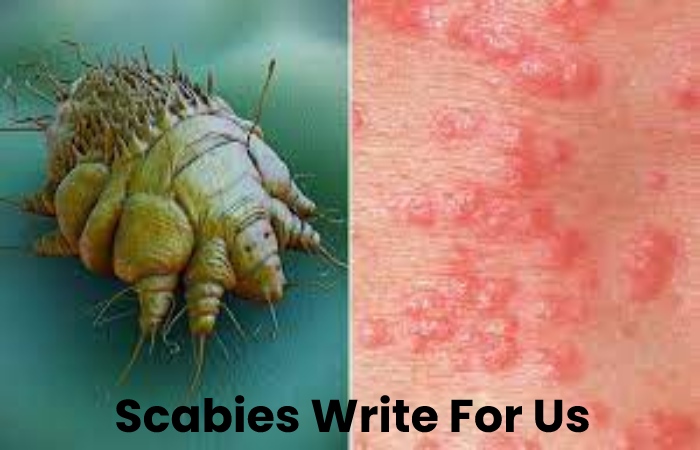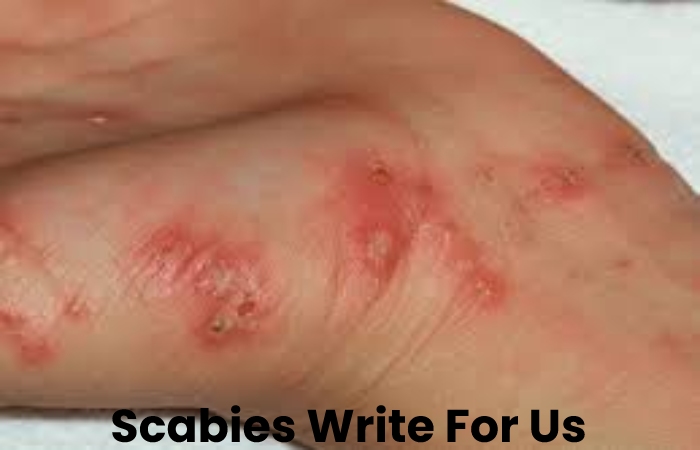Scabies Write For Us
Scabies is an itchy skin condition caused by a tiny burrowing mite, Sarcoptes Scabies. Intense itching occurs in the area where the mite hides. The urge to scratch can be powerful at night. Scabies is contagious and spreads rapidly through close physical contact in a family, school, or nursing home.
The symptom of Scabies is intense itching in the area where the mites burrow. Scabies treats by killing the mites and their eggs with medication applied from the neck down and left for eight hours. And also with the help of oral medications.
Scabies mites crawl but cannot fly or jump. They are stable at temperatures below 20 ° C, and they can survive for long periods at these temperatures.
How is Scabies Spread?
Scabies spreads by prolonged, direct skin-to-skin contact with someone who has Scabies. In general, the communication is long; a quick handshake or hug will usually not extended Scabies. Scabies transmits to sexual partners and household members. Scabies in adults is often acquired sexually.
How Long Does Scabies Last?
Scabies mites can live on a person for up to two months. However, once they are away from a person, the mites usually die within three to four days. If you are treating Scabies, you can expect the itching and burning of the rash to last for several weeks after starting treatment.
Can Scabies Go Away On Its Own?
Scabies does not go away on their own. To get rid of it and avoid passing it on to other people, you should use a special cream or lotion prescribed by a doctor. These products contain permethrin or another medicine. In severe cases, your doctor may also prescribe pills for you to take.
What Does Scabies Look Like At First?
The scabies rash looks like blisters or pimples – raised pink bumps with a clear, fluid-filled top. Sometimes they appear in a row. Your skin may have red, scaly patches. Scabies can also cause gray lines on the skin and red spots.
Symptoms of Scabies
- Red, itchy skin
- Blisters
- Extreme itching, especially in the evening or at night
- Small bites or bumps
- Trails where mites have sunk into the skin
- Scratch the sores
6 Tips For Treatment Of Scabies
- Anti-scabies drugs treat Scabies. Treatment failures are not common, but they are possible, and people with Norwegian Scabies may require a combination of different treatment methods.
- Apply an anti-mite such as permethrin (Elimite). These creams are helpful from the neck down, left on overnight, and then washed off. This application is repetitive in seven days.
- An alternative treatment is 1 ounce of 1% lotion or 30 grams of lindane cream, applied from the neck down and washed off after about eight hours.
- Ivermectin (Stromectol), an oral drug, is an antiparasitic drug that is an effective scabicide.
- Crotamiton 10% Lotion and 10% Cream (Eurax, Croatan) is another drug approved for the treatment of Scabies in adults but is not suitable for use in children.
- Wash sheets and sheets in hot water.
How to Submit Your Articles?
To Write for Us, you can email at contact@health4fitnessblog.com
Why Write for Health4fitnessblog– Scabies Write For Us
Search Terms Related to Scabies Write For Us
infestation
itchiness
pimple
ectoparasite
allergic reaction
poor immune system
permethrin
lindane
ivermectin
ringworm
bacterial skin infections
tropical climates
sarcoptic mange
Search Terms for Scabies Write For Us
Scabies Write For Us
Guest Post- Scabies
Scabies Contribute
Submit Post- Scabies
Scabies Submit An Article.
Scabies Guest Blogger
Writers Wanted Scabies
Scabies Suggests A Post.
Scabies Guest Author
Guidelines of the Article – Scabies Write For Us
You can send your article to contact@health4fitnessblog.com
Related pages:
CBD Write For Us
Dysphagia Write For Us
Scoliosis Write For Us
Sciatica Pain Write For Us
Cancer Write For Us
Lung Diseases Write For Us
Abdominal Pain Write For Us
Acidity Write For Us
Acne Write For Us
Acute Lymphoblastic Leukemia Write For Us
Dengue Write For Us
Pregnancy Write For Us
Psoriasis Write For Us
Diarrhea Write For Us
Migraine Write For Us
Monkeypox Write For Us
Typhoid Write For Us
Insomnia Write For Us
Parkinson’s Disease Write For Us
Heart Attack Write For Us
Hyperthyroidism Write For Us
Hepatitis B Write For Us
Malaria Write For Us
Kidney Stone Write For Us
Rheumatoid Arthritis Write For Us
Spondylosis Write For Us
Anemia Write For Us
Hemoglobin Write For Us

